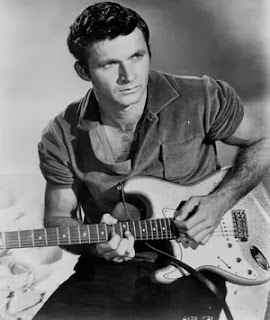Dick Dale, the undisputed King of Surf Guitar, died on March 16 2019 at the age of 81. Before his death he had been treated for heart failure and kidney failure.
Dick Dale was born Richard Anthony Monsour on May 4 1937 in Boston, Massachusetts. His father was of Lebanese descent and his mother of Polish-Belarusian descent. As a result he was exposed to the folk music of both ethnic groups as a child. Growing up he enjoyed swing music, and one of his earliest musical influences was drummer Gene Krupa. He taught himself to play ukulele. His uncle taught him to play the tarabaki. He bought a guitar from a friend for $8 and then learned to play it. In 1954 the family moved to Southern California. It was there that he took up surfing.
It was a country music DJ who gave him the name "Dick Dale", who felt it was a good name for a country musician. He played in local talent shows, and recorded a demo song, "Ooh-Whee Marie," for the California based Del-Fi label. It was in the late Fifties that Dick Dale invented surf rock. He played regularly at the the Rendezvous Ballroom in Balboa, California. This would lead to gigs at other local spots. It was in 1961 that his first single, "Let's Go Trippin", was released in 1961. It reached no. 60 on the Billboard Hot 100.
Several more singles followed in the wake of "Let's Go Trippin", including "Misirlou", "King of the Surf Guitar", "The Wedge", and others. Dick Dale's first album, Surfer's Choice,was released in 1962. It was followed by King of the Surf Guitar in 1963, Checked Flag in 1963, Mr. Eliminator in 1964, and Summer Surf. Dick Dale appeared in the "Beach Party" movies Beach Party (1963) and Muscle Beach Party (1964), as well as the movie A Swingin' Affair (1963).
While surf music was very popular in the United States for a time, it was overtaken by the British Invasion in 1964. Dick Dale's popularity declined and in 1965 and he was actually dropped by his label, Capitol. He continued to perform locally, but in 1966 he developed colorectal cancer. While he survived the disease, he was forced to retire from music for a time. In the coming years he pursued other interests than music, including caring for endangered animals and studying martial arts.
It was in 1986 that Dick Dale attempted a comeback. He recorded a benefit single for the University of California-Irvine Medical Centre's burn unit and in 1987 he appeared in the movie Back to the Beach. He appeared on the movie's soundtrack album as well. He appeared in the movie The Treasure (1990). In 1991 he made a guest appearance on funk metal Psychefunkapus's album Skin. It was a gig in the Bay Area that won him a contract with Hightone Records.
It was in 1993 that his first album in thirty years, Tribal Thunder, was released. It was followed by Unknown Territory in 1994. That same year his version of "Misirlou" made an appearance in Quentin Tarantino's movie Pulp Fiction. In the next few years he released the albums Calling Up Spirits (1996) and Spacial Disorientation (2001).
Except for perhaps Link Wray, Dick Dale was arguably the most influential guitarist in the history of rock music. He incorporated Eastern European and Middle Eastern melodies in his music, an innovation in rock music. He often used reverb, a rarity in rock music of the late Fifties and early Sixties. The speed with which he played guitar would not be matched for decades. Dick Dale played an important role in making rock music louder. In order to be heard over audiences, he worked with Leo Fender to develop amplifiers that would make guitars louder without sacrificing sound quality. Indeed, it was his work with Leo Fender that led to the development of the first 100-watt guitar amplifier. Dick Dale was the inventor of surf rock, but his oeuvre would have a lasting impact on other sub-genres of rock music. Both power pop and heavy metal might not have come into existence without both Dick Dale's guitar style and his work in creating more powerful amplifiers. Dick Dale was a man of incredible talent, talent so great that it would have a lasting impact on rock music and would lead to the creation of entirely new sub-genres.

No comments:
Post a Comment